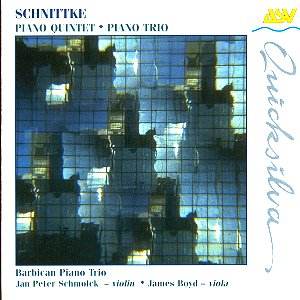Various stylistic features characterise Schnittke's
music, and he constantly sought to explore new frontiers. Much the most
significant factor was the sheer range of his expressive language, since
he reconciled seemingly divergent musical worlds in ways which remain
both accessible and powerfully direct.
Schnittke composed a String Trio in 1985, the year
he wrote his Viola Concerto for Yuri Bashmet. As a gesture of friendship
Bashmet arranged the Trio for string orchestra, and this opened up the
music's possibilities for other combinations; Schnittke himself made
the present arrangement for piano trio in 1992.
Between the initial composition and the subsequent
arrangement, Schnittke suffered a series of strokes which weakened his
health, but thankfully did not entirely obstruct his creative work.
The Trio has two movements. Both tend toward slower
tempi, though with many contrasting elements which create the range
necessary for a substantial composition. Of course this does require
the performers to share and communicate the vision, but there is no
problem in that sense as far as the Barbican Trio is concerned.. Their
interpretation is sensitive and thoroughly prepared, and the ASV recording
makes the most of the pleasing chamber music acoustic of St George's,
Brandon Hill.
The Piano Quintet, composed over a four-year period
during the mid-1970s, is surely one of Schnittke's best compositions,
exploratory and emotional. Much of it is extraordinarily refined and
restrained, for the composer eschews the temptation to prefer rich sonorities
with this potentially sonorous ensemble. The playing of the Barbican
Trio and colleagues is ever alert, and there are some really telling
expressive points which emerge naturally out of the controlled dynamic
shadings. This composition represents an interesting and in many ways
arresting approach to chamber music, confirming the view that the genre
encourages composers to their most profound inspirations.
As well as the excellent performances, the disc is
also distinguished by some particularly good notes by Malcolm MacDonald.
Terry Barfoot


